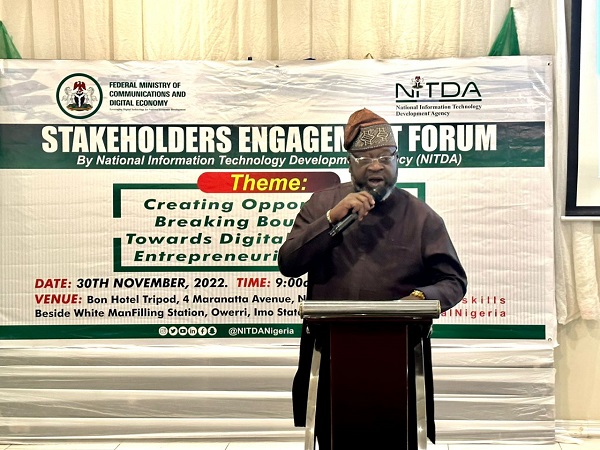
The National Information Technology Agency (NITDA), in collaboration with the Office of Digital Economy and e–Governance and the Imo State government, has engaged stakeholders in the state in its continuous drive towards fostering national development through efficient Information technology (IT) governance in Nigeria.
The objectives of the ICT Stakeholders’ Engagement Forum is, amongst others, to establish sustainable collaborations and consistent channels for feedback and the exchange of ideas as well as share with stakeholders NITDA’s vision and regulatory instruments for national development.
In his remarks, the director-general of NITDA, Mallam Kashifu Abdullahi challenged participants to use the meeting as a veritable platform to pool knowledge, experience, expertise and co-create solutions, articulate strategies, and extend NITDA’s services to all stakeholders, especially [those] at the grassroots.
Abdullahi, who was represented by the director, zonal offices directorate, Mr. Babajide Ajayi, noted that strategic actions are being taken in the implementation of critical areas of the National Digital Economy Policy and Strategy (NDEPS).
The NDEPS, the DG explained, is a strategic document approved by the Federal Executive Council (FEC) which focuses on eight pillars – developmental regulation, digital literacy and skills, solid infrastructure, service infrastructure, digital services development and promotion, digital society and emerging technologies, soft infrastructure and indigenous content development and adoption – critical to the development of the digital economy.
“Throughout the 21-year journey, we have had to look continuously at our mandate, reset our vision and invigorate our mission. We have moved from being a highly centralised organisation to a functionally decentralised Institution.
“Our aspiration is to be an organisation closer to stakeholders. Also, we are increasingly becoming a process-driven, data-dependent and results-oriented organisation.
“The agency’s strategies and choices are pursued while always ensuring financial prudence – even in the most turbulent times and ensuring that we meet the objectives of a national IT governance, foremost of which is delivering value to our stakeholders.”
While emphasising that stakeholders come first, Abdullahi assured everyone that NITDA’s goal is to deliver value to them and underscore the importance of the partnership and to be clear on their perspectives, aspirations and needs.
“Some of the people-oriented programmes we have implemented in consultation with stakeholders and under the supervision of our parent ministry, the Federal Ministry of Communications and Digital Economy, include the National Adopted Village for Smart Agriculture (NAVSA), the National Adopted School for Smart Education (NASSE), digital literacy capacity training for persons living with disabilities, support for ICT innovation hubs and building of community IT centres, development of state IT policies, etc.
“However, there is always the need to re-strategise in the face of new challenges and opportunities that the digital economic ecosystem affords. Therefore, the NITDA Strategic Roadmap and Action Plan (SRAP), 2021-2024, has been conceived to provide direction for the organisation and create a sound platform for mitigating both foreseen and unforeseen threats to the digital economy ecosystem,” the DG maintained.
Abdullahi hoped that the engagement with stakeholders across the country will provide fresh understanding and ideas on how NITDA can deliver more impactful values to Nigerians.
In his keynote address, Imo State governor, Hope Uzodima, represented by the Imo State Commissioner for Digital Economy and e-Government, Dr. Chimezie Amadi commended NITDA for organising the meeting.
He called on the state government to first strengthen the foundation of digital infrastructure to broaden access to new opportunities, build an innovation ecosystem, enhance workforce quality and institute social protection frameworks.
The programme themed “Creating Opportunities, Breaking Boundaries: Towards Digitisation and Entrepreneurial Evolution” was attended by 81 stakeholders drawn from three states in the southeastern region.
Participants ranged from ICT experts, government representatives, academia, startup ecosystems, ICT associations, technology solution providers, non–governmental organisations (NGOs) and relevant stakeholders in the digital economy sector.
The event featured presentations by NITDA officials, keynote addresses, interactive sessions and several goodwill messages from participants.


